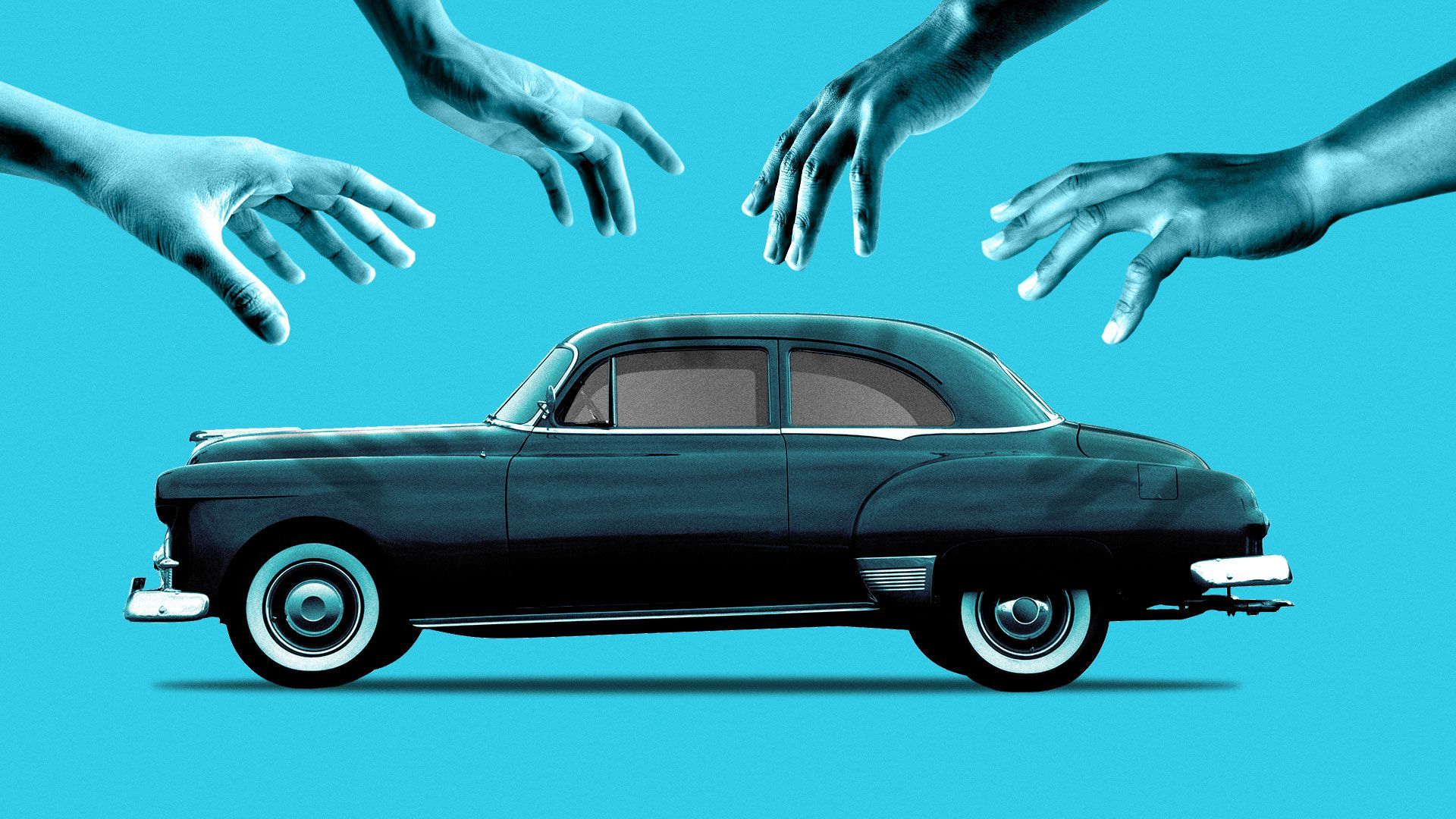It's a great time to be a car dealer — but not so hot for buyers
Add Axios as your preferred source to
see more of our stories on Google.

Illustration: Eniola Odetunde/Axios
Anyone looking to buy a car right now is likely to find fewer choices and higher prices — with very little room to negotiate.
The big picture: The pandemic has thrown off the natural balance between supply and demand for new and used cars, driving up vehicle prices and putting all the bargaining power into the hands of car dealers, who are enjoying fatter-than-normal profits.
What's happening: It's nothing like the Great Recession of 2008-2009, which forced General Motors and Chrysler into bankruptcy and left other global automakers on the ropes.
- Back then, the banking and credit crisis caused sales to collapse suddenly, but manufacturers kept producing cars, albeit at lower levels.
- This time, the pandemic shut down production for two months, but buyers came back to the market sooner than expected.
- "This recession is unlike any that the auto industry has seen before," says Jonathan Smoke, chief economist at Cox Automotive.
Between the lines: An extraordinary set of circumstances has created the perfect seller's market:
- In mid-March, every major auto manufacturer stopped production — for the first time since World War II.
- That led to a shortage of vehicles on dealer lots, in particular pickup trucks and SUVs.
- Used cars grew scarce too, as fewer people traded in vehicles or returned leases during the pandemic's early lockdowns. And many banks aren't collecting on bad auto loans, either, meaning that fewer vehicles than usual were repossessed.
But consumer demand proved resilient in the months after the initial crisis as dealers made it easier to shop online.
- Federal stimulus checks, plus the extra $600 weekly unemployment benefits, helped grease the market (though both programs are over now).
- Big incentives, including longer loans, helped put car payments within reach for many.
- Shifts in attitudes toward public transportation during the pandemic also drove more people into the car market, many for the first time.
It's basic economics: When demand is high for something that's in short supply, prices go up.
- The average transaction price on a new car is $38,414, up about $400 since January and $1,200 since last July, per Cox data.
- The spike is even more pronounced on used-car lots, where list prices are up $900 this year alone, to an average $20,445.
- At wholesale used-car auctions, dealers are fighting over scarce inventory, bidding up prices — which of course get passed on to consumers looking for a good, affordable, late-model used car.
- On the flip side, you'll get more for your trade-in right now if you decide to upgrade.
The roller-coaster now has dealers feeling flush. After a brutal spring, many are now seeing record profits.
- Gross profit on new vehicle sales in the most recent week of August was more than $1,100 per unit, up almost $800 vs. the same week last year, says Tyson Jominy, vice president of data and analytics at J.D. Power.
- Gross profit on used vehicles is "easily" twice that, according to the research firm's used car specialist, Larry Dixon.
- Yes, but: as noted, they're paying more to acquire used-car inventory, so their overall margins are a bit narrower.
What to watch: The rest of the year remains a big question mark, and the volume of auto sales will likely depend on the virus and the government's response, says Smoke, the Cox economist.
- If the federal government does more to prop up the economy, including more stimulus money for consumers, he expects auto sales to keep rising. But if unemployment worsens, demand will fall.
Toyota sales chief Bob Carter, for one, is optimistic. "The industry is returning to health. The main issue right now is supplying the vehicles that customers want to buy — especially trucks and SUVs."
Editor's note: This item has been corrected to state that the extra $600 in unemployment benefit payments were weekly (not monthly).
